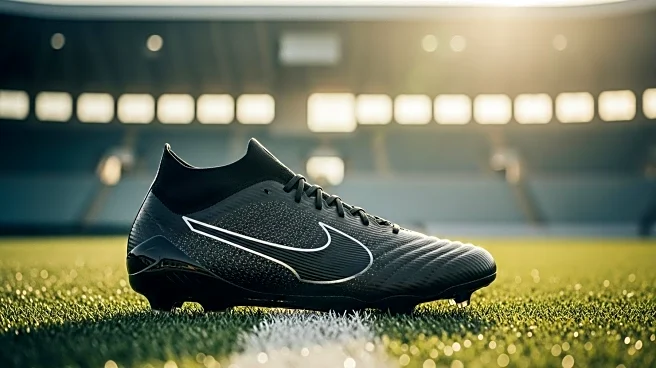What is the story about?
What's Happening?
Antonee 'Jedi' Robinson, a 28-year-old left back, has rejoined the U.S. national soccer team after undergoing right knee surgery in May. The surgery followed an injury sustained during friendlies against Panama and Mexico last October, which led to tendinopathy due to calcification in his quadricep tendon. Despite his return, Robinson admits he is not yet at full strength, stating he is still working towards regaining his pre-injury form. He has been limited to substitute appearances for Fulham in the Premier League this season, following a successful previous season where he started 35 out of 38 games. Robinson's recovery took approximately 11-12 weeks, and he is now preparing for upcoming matches against Ecuador and Australia as part of the U.S. team's World Cup preparations.
Why It's Important?
Robinson's return is significant for the U.S. national team as they prepare for the next year's World Cup. His experience and skill as a left back are valuable assets, especially given his previous performances in international competitions. However, his current fitness challenges could impact the team's defensive strategies and overall performance. The situation also highlights the physical demands and recovery challenges faced by professional athletes, which can affect team dynamics and player availability. Robinson's struggle to regain his starting position at Fulham further underscores the competitive nature of professional sports, where injuries can alter career trajectories and team compositions.
What's Next?
Robinson's immediate focus is on regaining full fitness and proving his readiness to contribute effectively to both the U.S. national team and Fulham. His performance in upcoming friendlies will be closely watched by coaches and fans, as it will determine his role in the team's World Cup campaign. Fulham's manager, Marco Silva, has been utilizing Ryan Sessegnon as the starting left back, which means Robinson will need to demonstrate his capabilities to reclaim his position. The U.S. team's coaching staff will also need to assess Robinson's fitness and decide on his involvement in future matches, balancing his recovery needs with the team's competitive goals.
Beyond the Headlines
Robinson's situation sheds light on the broader issues of athlete health management and the impact of injuries on career longevity. The decision to undergo surgery and the subsequent recovery process reflect the critical role of medical interventions in sports. Additionally, Robinson's experience highlights the importance of mental resilience and adaptability in overcoming setbacks, which are essential traits for athletes facing physical challenges. The competitive environment in professional sports demands continuous performance improvement, and Robinson's journey is a testament to the dedication required to maintain a high level of play despite obstacles.
















